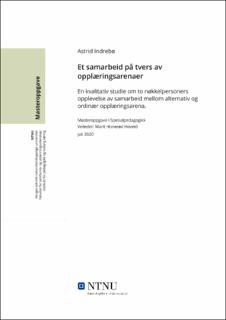| dc.contributor.advisor | Hoveid, Marit | |
| dc.contributor.author | Indrebø, Astrid | |
| dc.date.accessioned | 2021-09-28T17:39:55Z | |
| dc.date.available | 2021-09-28T17:39:55Z | |
| dc.date.issued | 2020 | |
| dc.identifier | no.ntnu:inspera:53268456:16777497 | |
| dc.identifier.uri | https://hdl.handle.net/11250/2784718 | |
| dc.description.abstract | I denne studien har jeg undersøkt to personers opplevelse av samarbeid mellom ordinær og alternativ opplæringsarena. Hensikten med studien har vært å bidra med en dypere forståelse for hvordan samarbeid på tvers av opplæringsarenaer oppleves. Valget av tema har blant annet bakgrunn i regjeringens opptrappingsplan “Opptrappingsplan for barn og unges psykiske helse” 2019-2024, hvor det er satt fokus på å videreutvikle alternative opplæringstilbud (Helse- og omsorgsdepartementet, 2019). Studien gjennomført av Jahnsen, Nergaard, Rafaelsen og Tveit (2009) inspirerte/motiverte meg også til å velge dette temaet da de peker på at samarbeid mellom opplæringsarenaen har vist seg å være utfordrende å få til.
Studiens problemstilling er: «Hvordan opplever to nøkkelpersoner samarbeidet mellom en alternativ og en ordinær opplæringsarena?» Problemstillingen har blitt undersøkt gjennom semistrukturerte intervjuer, hvor nøkkelpersonene kommer fra hver sin opplæringsarena og har deltatt i et samarbeid rundt en elev på småtrinnet. Dette har resultert i to hovedfunn. Det første funnet viser at nøkkelpersonene har opplevd samarbeidet som vellykket. Faktorer som trekkes frem er god samhandling, organisering av samarbeidet og en generell opplevelse av at det har vært verdifullt og lærerikt. Dette har videre ført til ny kunnskap og trygghet til informanten fra hjemmeskolen. Det fremgår også at eleven i ettertid har hatt mindre fravær på hjemmeskolen.
Det andre funnet peker på at selv med en opplevelse av et vellykket samarbeid, har ikke dette ført til de ønskede endringene på hjemmeskolen. Jeg har derfor drøftet videre «Hvorfor har ikke samarbeidet ført til tilstrekkelig endring på hjemmeskolen?». Jeg har da sett på utfordringer med å få til endringer i kulturen på trinnet, og informantens opplevelse av å bli alene med endringsarbeidet.
Flere teorier viser at det ikke er mulig å endre skolekulturer/trinnkultur alene. Endringsarbeidet bør være godt forankret i ledelsen og involvere flere ansatte. Blant disse teoriene kan systemperspektiv, organisasjonskultur (Edgar Schein, 1987), og endringsledelse (Kotter, 2012) nevnes. Et begrep som også er viktig å merke seg er «lærende skole». | |
| dc.description.abstract | In this study, I have been researching two persons experiences of the cooperation between traditional schools and alternative educational programs. The aim of the study was to contribute to a deeper understanding of how this cooperation is experienced. My decision to choose this topic was partly based on the Norwegian government’s step-by-step behavioural plan for mental health in children and youth “Opptrappingsplan for barn og unges psykiske helse” of 2019-2024. In this plan it is stated that alternative educational offers should be further developed (Ministry of Health and Care Services, 2019). In addition, the study by Jahnsen et al. (2009) also motivated me to choose this particular topic, as they show how challenging cooperation between different educational programs can be.
The research question of this study is: “How are the study’s two key persons experiencing the cooperation between an alternative and a traditional educational programme?” To answer this question, I have been conducting semi-structural interviews, where the interviewees have background in different educational programmes, and have been part of a team following a single primary school pupil. My research resulted in two main findings. The first find shows that the key persons found the cooperation a success, highlighting the following significant factors: effective interaction, well-organised cooperation and a general feeling of a valuable educational experience. This has further led to the traditional school’s informant gaining both new knowledge and a feeling of confidence. Another positive outcome of the cooperation was that the pupil in question showed up at the traditional school more often after the cooperation, than they (gender neutral pronoun) had done before.
The second find of the research indicates that even with the feeling of a beneficial and successful cooperation, the sought-after changes at the traditional school were not achieved. Based on this find, I further discussed “Why did the sought-after changes not occur at the traditional school?”. I looked at both the challenges of making changes in the particular class culture in question, and the informant’s experience of having to deal with this work alone.
Several theories show that it is not possible to change school culture alone. The work of changing such a culture should be well-grounded in the management, as well as include several employees. Amongst these theories are the system perspective, organisational culture (Edgar Schein, 1987), and leading change (Kotter, 2012). The term «learning school» also proves significant in this discussion. | |
| dc.language | nob | |
| dc.publisher | NTNU | |
| dc.title | Et samarbeid på tvers av opplæringsarenaer. En kvalitativ studie om to nøkkelpersoners opplevelse av samarbeid mellom alternativ og ordinær opplæringsarena. | |
| dc.type | Master thesis | |
